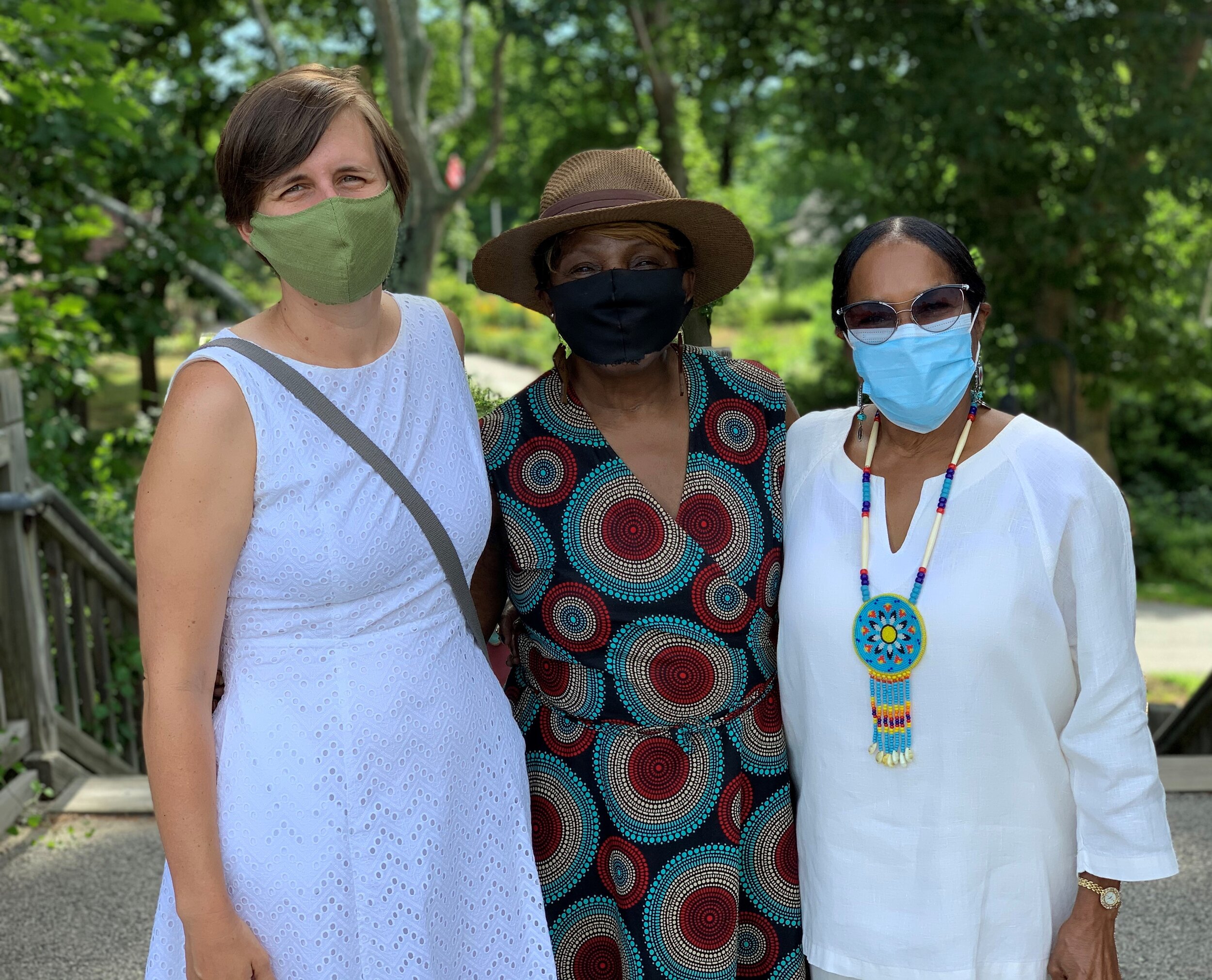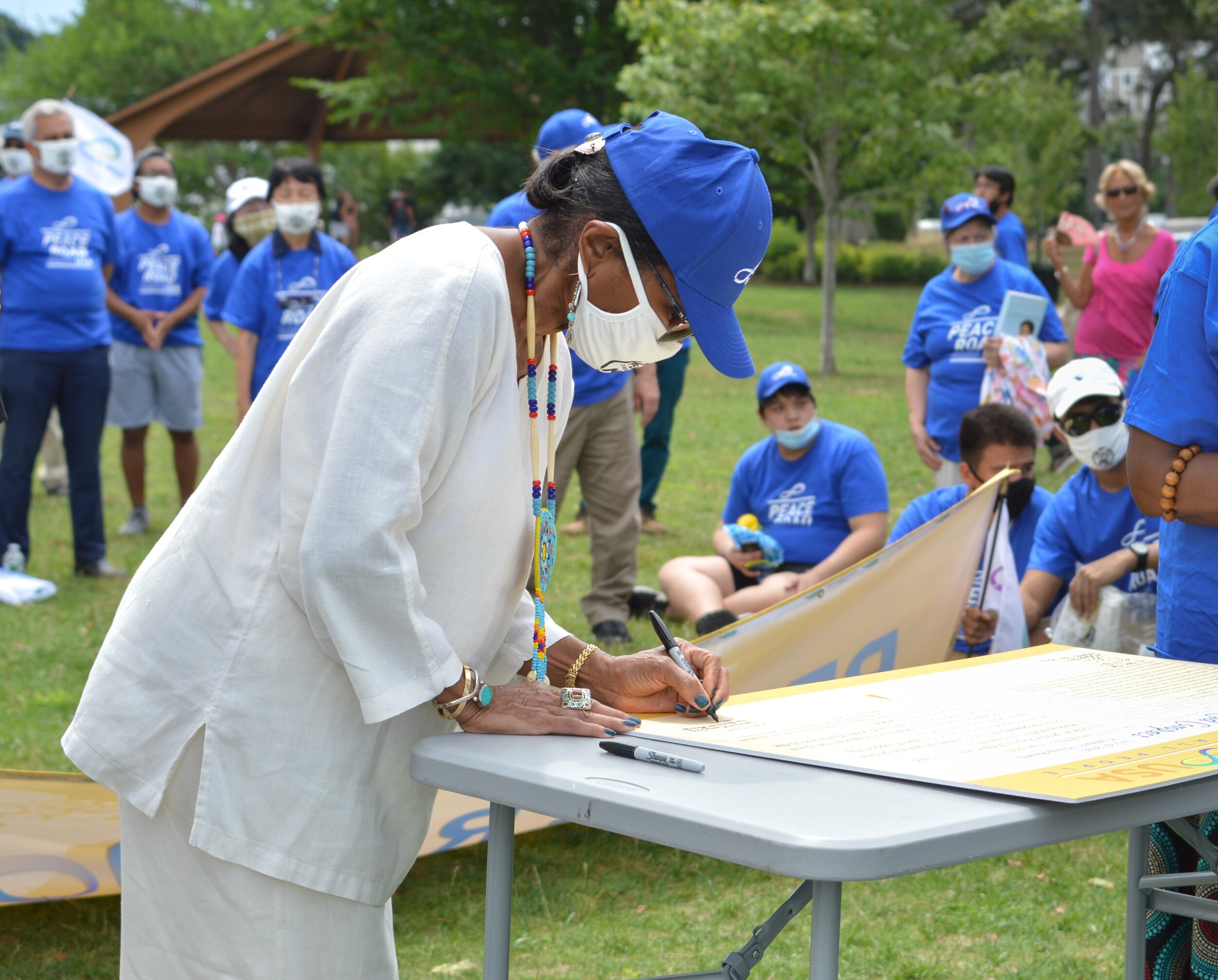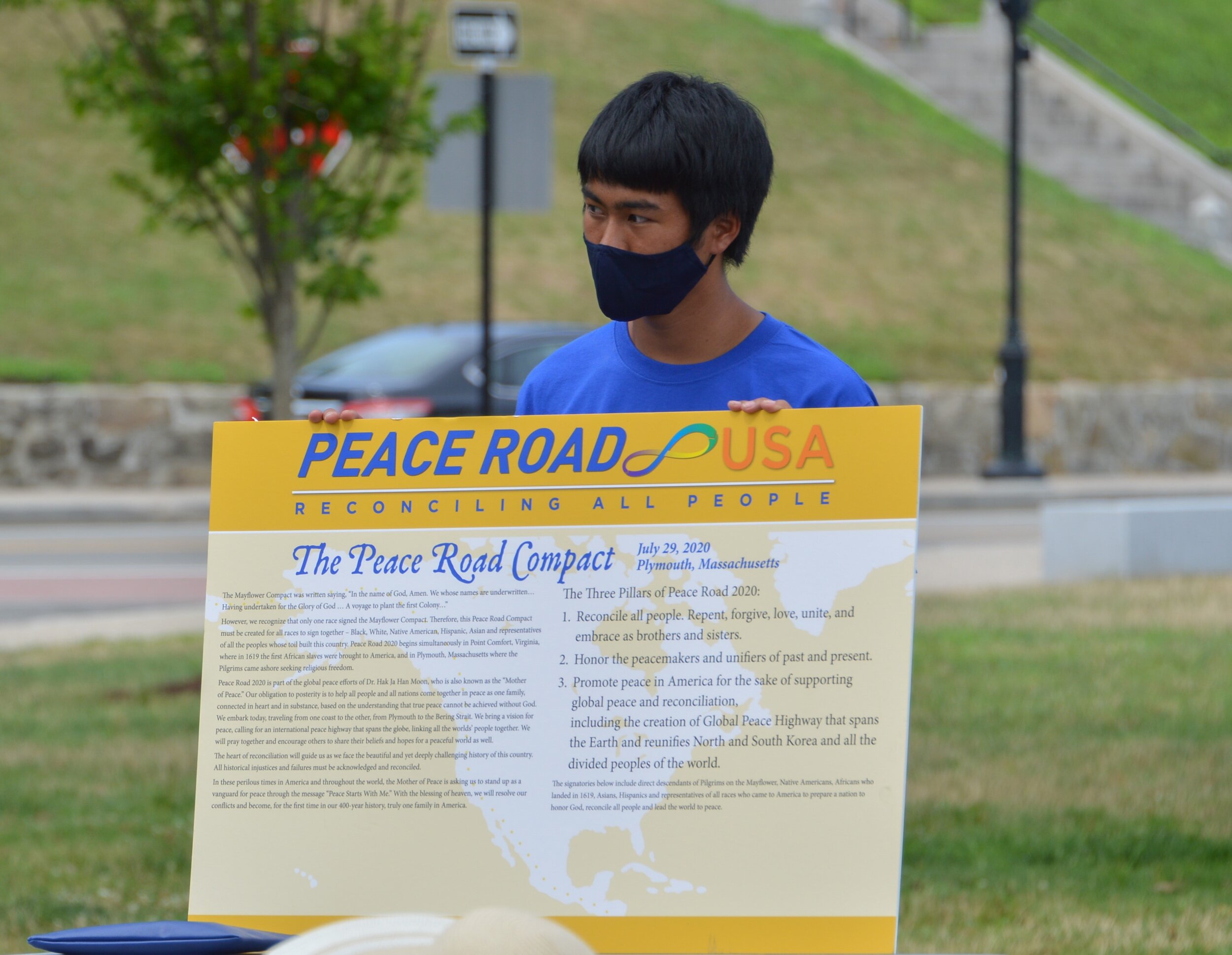Peace Road 2020: Native American, African American and White women stand together at Plymouth Rock
From left to right: Katarina Connery, Rev. Juanita Pierre-Louis and Dottie Chicquelo
Editor’s Note: WFWP USA Vice President Katarina Connery offers her reflections and deep insight on the historical significance of the Peace Road 2020 kick-off event in Plymouth, and the impact of women leaders working together. Read more on Peace Road here and here.
Plymouth, Massachusetts is a place steeped in history. This year of 2020 marks the 400th anniversary of the Pilgrims landing on this shore after their 2 month journey across the ocean. For some, this history represents a glorious beginning of our nation based on overcoming challenges with a spirit of adventure and a faithful desire to worship God in freedom. For others, this time marks the beginning of adversity for their people, oppression of other races, physical and spiritual slavery, and more. On July 29, 2020, the National Peace Road Tour was launched at Plymouth Rock to honor and learn from the past as well as take steps to reconcile across our divides with a hope to build a better community and world together.
Several of our WFWP leaders and representatives had the opportunity to attend and speak at this historic launch of the Peace Road 2020 in Plymouth, including Rev. Juanita Pierre-Louis, WFWP USA Senior Vice President, Ms. Dottie Chicquelo, WFWP member and representative of the Cherokee Nation, and myself, Katarina Connery, WFWP USA Vice President. I feel it was significant for the three of us representing African American, Native American, and White women, respectively, to be there on that day. I cannot help but reflect on what could have been in those formative years of our nation, and what can be now as we strive to acknowledge and reconcile what has been done between our races?
The day started off with a tour of the Plimoth Patuxet Plantation, which is a living museum of those early colonists and the Native Peoples who lived as neighbors. Imagine if you will the dreams and heart of those people who left everything they knew in Europe, traveling to an unknown land, to start fresh with the hope to build a community centered on God. Arriving in November 1620, what must have they thought of this land? Did it seem desolate and unwelcome or did they see the promise of a future dedicating their lives to God?
WFWP Co-Founder Rev. Dr. Sun Myung Moon spoke often about the spirit of the early Pilgrims: “Think of it: They had to give up their families, their relatives, their surroundings, and their country, and head toward an unknown land. Their only hope was in God. Every step they took they depended upon God. Their journey was long, and there were many storms. They prayed unceasingly to God. They had but one way to turn. They turned to God. When they were sick and dying on the voyage, they had no medicine to take, no doctor to care for them; they turned to God. Those Pilgrim men and women were one with God. And that is how they survived.”
Of course, there were already people living here long before they arrived. The Wampanoag tribes, whose name means “People of the First Light,” had been living in the area of what is now Massachusetts and parts of Rhode Island for thousands of years. In the 1600s, the Wampanoag Nation included approximately 40,000 people in 67 villages. What must they have thought of these strangers settling in their lands? The Mayflower’s passengers were only 102 people, half of whom died during that first grueling winter. The Pilgrims were at the mercy of the land and the Native Americans, who could have possibly wiped them out quite easily. History tells us that the Wampanoags extended that hand of giving to the Pilgrims, which surely must have come as the gift from God they were praying for. It was Wampanoags who taught the colonists how to plant corn and other crops and places to hunt and fish. Wampanoags, including Tisquantum (also known as Squanto), acted as mediators between the settlers and the Native tribes to set up peace agreements.
For these two peoples, it must have been an incredible clash of cultures. They must have seemed so foreign to each other, not only in terms of appearance and dress. The Pilgrims were of a group of Puritans known as the English Separatist Church, who sought to escape the religious controversies they saw in England. The Wampanoag’s spiritual practice included worshipping and thanking Mother Earth, the plants, the animals, and all living things for the gifts to their people. Coming from Europe, the Pilgrims were primarily patriarchal; indeed it was only the men who signed the Mayflower Compact and later governed the colony. The Wampanoags had a matrilineal system, in which women controlled property and heredity was passed through the mother. Women elders also approved the selection of chiefs and were sometimes chosen as chiefs. These are just a few of the differences.
At the Peace Road program right across from the pavilion housing Plymouth Rock, Rev. Juanita Pierre-Louis spoke of several tests from God throughout history. She said, though it was God who created America through these people, founded upon His principles, for many these principles ended up as only concepts. God tested America at significant points in history to stand up on the side of righteousness, but we have often fallen short. Her ancestors came across the ocean as well so long ago, but on a different part of the boat. Ms. Dottie Chicquelo, representing her Cherokee and African American ancestry, spoke about how people failing to stand on the side of righteousness resulted in the suffering of her people. Why should I come to Plymouth, she asked, where the Pilgrims and their descendants insisted that my grandfathers and grandmothers were less than human? This was a place that represents for her, and many others, the discord.
I wonder what could have been if the Pilgrims had sought to more deeply understand, learn from, and embrace the Native Americans they encountered, rather than seeking to impose only their own Christian understanding. Could they not have also benefited from a deep reverence for Mother Earth and sacredness of all living things? What could have been if the spirit of fellowship and thanking God for their blessings represented in the first Thanksgiving had permeated all of their dealings? Rather than seeking to push the Native Americans off of their ancestral homelands in order to find homes for their own families, what if they had found a way to co-exist and continuously learn from each other? We can do so much more together than alone.
Both Rev. Juanita and Ms. Chicquelo highlighted the words of Dr. Hak Ja Han Moon on women’s important role in peace building and righting these wrongs of the past in her recently released memoir, “Mother of Peace.” Dr. Moon says, “Each new generation endures heartache.” Women know how to address, as Ms. Chiquelo noted, the root causes and how to clean up the mess since we do it all the time. Dr. Moon also says, “The mother builds the family, the family builds the world.” As Rev. Juanita explained, mothers have the important role of bringing our children home and healing that pain with a loving hand. It’s not an easy road, since the trauma and its aftermath have been endured for generations. Now is the time, indeed it is long overdue, for women to take that role and create what might have been so long ago.
As each of us signed the new Peace Road Compact as representatives who were not present during the original Mayflower Compact signing--Native Americans, African Americans, and women--we make a pledge to seek to understand each other, to love, repent, forgive, and unite. Again, as Dr. Moon says in her memoir, “The world of the future can be a world of reconciliation and peace, but only if it is based on the maternal love and affection of women.” We may stumble along the way, but this event represented just one small step toward making that future world of reconciliation and peace a reality.







